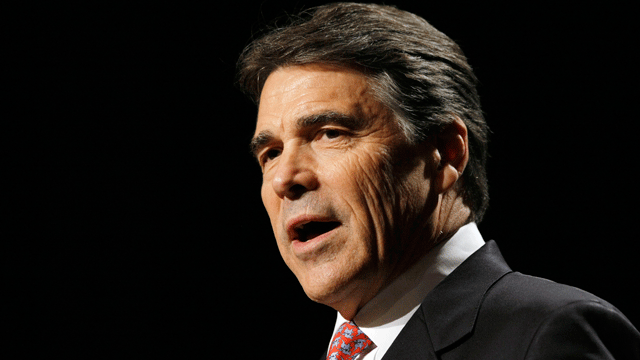
In this June 23, 2011 file photo, Texas Gov. Rick Perry speaks during the 28th annual National Association of Latino Elected and Appointed Officials conference in San Antonio.
The fanfare and hype surrounding Rick Perry's likely entry into the GOP presidential primary race may help the Texas governor make up the ground he lost with a late start. But presidential primary history also suggests a Perry-come-lately is no sure bet either.
Indeed, Fred Thompson and Rudy Giuliani proved in 2008 that presidential campaigns that capture national attention or raise tons of money can still stumble out of the gates and eventually flop if they don't get ahead early.
So far, Perry seems to be making all the right moves. He is speaking at a conservatives’ conference in South Carolina and attending a house party in New Hampshire, two early primary states. He will visit Waterloo, Iowa, on Sunday, just hours after the results of the nonbinding straw poll in Ames are released.
But Perry won’t be participating in Thursday’s debate sponsored by Fox News and the Washington Examiner because he hasn’t officially joined the race yet.
Watch the 2012 presidential debate Thursday live on Fox News and on FoxNews.com. Coverage will start at 8:45 pm ET at http://live.foxnews.com.
While some think Perry is the candidate who will galvanize the party, others point to Thompson’s failure after a late start in the 2008 GOP race. Thompson, an actor and former Tennessee senator, entered in late 2007 to the delight of conservatives. But he was out by January after he quickly fizzled in the polls.
"Fred Thompson turned out to be a complete dud," said Fergus Cullen, the former chairman of the New Hampshire Republican Party. "That doesn't mean Rick Perry will turn out to be a dud. ... I'm just cautionary because we've seen this movie before."
The high expectations some Republican voters have for Perry also could be a liability, as other past candidates have shown such expectations are hard to live up to.
Former New York City Mayor Giuliani ran in 2008 on the strength of his response to the Sept. 11 terrorist attacks, and he jumped to the front of the pack in early national polls. But his strategy of skipping the early primaries to focus on Florida backfired and he failed to win a single state.
In 2004, Howard Dean set the political world abuzz with his Internet campaigning and 50-state strategy. His fierce opposition to the Iraq war helped him draw more media attention and money than his rivals. He was also viewed as the front-runner with his lead in early polls. But Dean’s campaign imploded when he came in third in the Iowa caucuses and delivered a concession speech that ended with what is now known as the “Dean Scream.” Dean eventually bowed out of the race after losing the Wisconsin primary.
In 1996, then Texas Sen. Phil Gramm amassed more than $8 million and had $13.5 million in the bank at the end of the first quarter for campaigning. He also tied Bob Dole for first place in the 1995 Iowa Straw Poll. But Gramm’s campaign quickly lost steam when he finished fifth in the Iowa caucus and lost the Louisiana caucus to Pat Buchanan. Gramm dropped out before the New Hampshire primary.
In 1980, John Connally, the former governor of Texas, raised $13.7 million for his Republican bid but managed to win only a single convention delegate.
In 1972, Ed Muskie, then a senator from Maine and the early favorite to become the Democratic nominee, blew his chance when he let the Manchester Union-Leader’s attacks on him and his wife get under his skin. Muskie tore into Loeb in front of the newspaper’s building during a snowstorm with “tears streaming down his face,” in an emotional display that upended his image and led to his collapse as the front-runner. Reporters later said the “tears” could have been melting snow.
The Associated Press contributed to this report.





















